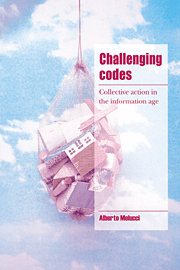Book contents
- Frontmatter
- Contents
- Preface and acknowledgements
- Introduction
- Part I Theory of collective action
- Part II Contemporary collective action
- Part III The field of collective action
- Part IV Acting collectively
- 15 Mobilization and political participation
- 16 The organization of movements
- 17 Leadership in social movements
- 18 Collective action and discourse
- 19 Forms of action
- 20 Research on collective action
- References
- Index
18 - Collective action and discourse
Published online by Cambridge University Press: 23 November 2009
- Frontmatter
- Contents
- Preface and acknowledgements
- Introduction
- Part I Theory of collective action
- Part II Contemporary collective action
- Part III The field of collective action
- Part IV Acting collectively
- 15 Mobilization and political participation
- 16 The organization of movements
- 17 Leadership in social movements
- 18 Collective action and discourse
- 19 Forms of action
- 20 Research on collective action
- References
- Index
Summary
Ideology and frames
Framing processes, as discussed in the recent literature on social movements (Snow et al. 1986; Snow and Benford 1988, 1992; Benford 1993; see also Gamson 1992b) are part of the symbolic production of a social movement. The literature on frames contributes to a better understanding of how actors define their action but it tends to forget the ‘ideological’ aspect of such a definition. As a relational process, framing activity is related to the particular position of the actor in the social field and carries with itself the partiality, plurality and tensions of that position. Frames are to be defined as the discoursive representation of collective action organized according to the position of the actor in the field, and they must be located within a theory of ideology. Even after Mannheim (Mannheim 1960; see also Shils 1968; Manning 1980), sociological thought is still a prisoner to its dualistic inheritance, which considers symbolic production either as a transparent expression of beliefs and values or as a pure reflex of material interests. Recent advances in theory (for a synthesis, see Thompson 1984, 1990; Wuthnow et al. 1984, Wuthnow 1987, 1989; Swidler 1986, 1995; Billig 1991, 1992; Billig et al. 1988) have contributed to a new awareness of the complexity of cultural and symbolic levels in individual and collective action.
Ideology is a key analytical level for the understanding of social movements and should include the framing activities as part of the representational system of the actor.
- Type
- Chapter
- Information
- Challenging CodesCollective Action in the Information Age, pp. 348 - 360Publisher: Cambridge University PressPrint publication year: 1996



